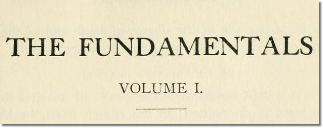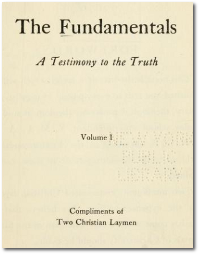The Proof of the Living God, as Found in the Prayer Life of George Muller of Bristol
 [node:22019 collapsed body]
[node:22019 collapsed body]
As iron sharpens iron,
one person sharpens another. (Proverbs 27:17)
 [node:22019 collapsed body]
[node:22019 collapsed body]
 [node:22019 collapsed body]
[node:22019 collapsed body]
CHAPTER IV. THE PERSONALITY AND DEITY OF THE HOLY SPIRIT.
 [node:22019 collapsed body]
[node:22019 collapsed body]
CHAPTER 2: THE DEITY OF CHRIST
BY PROF. BENJAMIN B. WARFIELD, D. D., LL. D., PRINCETON THEOLOGICAL SEMINARY.
A recent writer has remarked that our assured conviction of the deity of Christ rests, not upon “proof-texts or passages, nor upon old arguments drawn from these, but upon the general fact of the whole manifestation of Jesus Christ, and of the whole impression left by Him upon the world.” The antithesis is too absolute, and possibly betrays an unwarranted distrust of the evidence of Scripture. To make it just, we should read the statement rather thus: Our conviction of the deity of Christ rests not alone on the scriptural passages which assert it, but also on His entire impression on the world; or perhaps thus: Our conviction rests not more on the scriptural assertions than upon His entire manifestation. Both lines of evidence are valid; and when twisted together form an unbreakable cord. The proof-texts and passages do prove that Jesus was esteemed divine by those who companied with Him; that He esteemed Himself divine; that He was recognized as divine by those who were taught by the Spirit; that, in fine, He was divine. But over and above this Biblical evidence the impression Jesus has left upon the world bears independent testimony to His deity, and it may well be that to many minds this will seem the most conclusive of all its evidences. It certainly is very cogent and impressive.
The justification which the author we have just quoted gives of his neglecting the scriptural evidence in favor of that borne by Jesus’ impression on the world is also open to criticism. “Jesus Christ,” he tells us, “is one of those essential
22 The Fundamentals
truths which are too great to be proved, like God, or freedom, or immortality.” Such things rest, it seems, not on proofs but on experience. We need not stop to point out that this experience is itself a proof. We wish rather to point out that some confusion seems to have been fallen into here between our ability to marshal the proof by which we are convinced and our accessibility to its force. It is quite true that “the most essential conclusions of the human mind are much wider and stronger than the arguments by which they are supported;” that the proofs “are always changing but the beliefs persist.” But this is not because the conclusions in question rest on no sound proofs; but because we have not had the skill to adduce, in our argumentative presentations of them, the really fundamental proofs on which they rest.
 [node:22019 collapsed body]
[node:22019 collapsed body]
CHAPTER 1: THE VIRGIN BIRTH OF CHRIST
BY THE REV. PROF. JAMES ORR, D. D., UNITED FREE CHURCH COLLEGE, GLASGOW, SCOTLAND.
It is well known that the last ten or twenty years have been marked by a determined assault upon the truth of the Virgin birth of Christ. In the year 1892 a great controversy broke out in Germany, owing to the refusal of a pastor named Schrempf to use the Apostles’ Creed in baptism because of disbelief in this and other articles. Schrempf was deposed, and an agitation commenced against the doctrine of the Virgin birth which has grown in volume ever since. Other tendencies, especially the rise of an extremely radical school of historical criticism, added force to the negative movement. The attack is not confined, indeed, to the article of the Virgin birth. It affects the whole supernatural estimate of Christ — His life, His claims, His sinlessness, His miracles, His resurrection from the dead. But the Virgin birth is assailed with special vehemence, because it is supposed that the evidence for this miracle is more easily got rid of than the evidence for public facts, such as the resurrection. The result is that in very many quarters the Virgin birth of Christ is openly treated as a fable. Belief in it is scouted as unworthy of the twentieth century intelligence. The methods of the oldest opponents of Christianity are revived, and it is likened to the Greek and Roman stories, coarse and vile, of heroes who hid gods for their fathers. A
8 The Fundamentals.
special point is made of the silence of Paul, and of the other writings of the New Testament, on this alleged wonder.
 The Fundamentals was a series of articles first published between 1910 and 1915 as the fulfillment of an oil millionaire’s (Marsden, 118) dream. He didn’t dream of becoming a Christian publishing magnate. Rather, Lyman Stewart aimed to fortify Christian leaders in the fundamentals of the faith against the tide of unbelief—specifically the unbelief of higher criticism.*
The Fundamentals was a series of articles first published between 1910 and 1915 as the fulfillment of an oil millionaire’s (Marsden, 118) dream. He didn’t dream of becoming a Christian publishing magnate. Rather, Lyman Stewart aimed to fortify Christian leaders in the fundamentals of the faith against the tide of unbelief—specifically the unbelief of higher criticism.*
Discussion